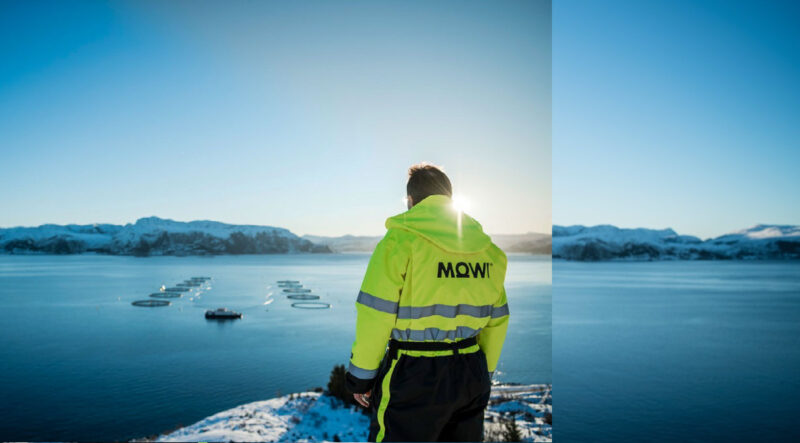Salmon farmer Mowi tops global sustainable protein rankings
Salmon farmers at the forefront of sustainable food production in the latest Coller FAIRR Protein Index, which ranks the world’s key food producers on sustainability
By
SeaWestNews
As the debate over maritime aquaculture rages on in British Columbia, two of the biggest salmon farming companies operating in the province, have topped a global index that ranks the best sustainable protein producers in the world.
Leading the Coller FAIRR Protein Producer Index for the third year in a row is Mowi, the world’s largest producer of Atlantic salmon, which operates farms and processing plants in BC’s Central Coast, Vancouver Island and in Surrey, where more than 400 people raise 30,000 tonnes of sustainable fish each year.
Second on the list is Grieg Seafood, whose BC operations includes 22 farms and a hatchery which employs 180 people to produce 23,400 tonnes salmon annually.
“Aquaculture companies – primarily salmon companies – continue to perform better than animal protein producers on all risk factors, especially deforestation & biodiversity and the use of antibiotics,” said the authors of the index.
This report, now in its fourth edition, assesses 60 of the largest listed global meat, dairy and aquaculture companies on ten environmental, social and governance themes aligned with the Sustainable Development Goals (SDGs).
“This shows again that Mowi is at the forefront of sustainable food production. I am proud and humbled to lead a company and an organisation that is a recognised leader in sustainable food production. Importantly, the Index highlights that aquaculture and salmon farming is part of the solution toward shifting to a green economy,” said Mowi CEO Ivan Vindheim.
The Coller FAIRR Protein Producer Index, assesses 60 of the largest, listed global meat, dairy and aquaculture companies on ten environmental, social and governance themes aligned with the Sustainable Development Goals (SDGs). The Index is designed to provide financial institutions with best-in-class data, analytics and trends on the protein sector to integrate into their investment decisions and engagement strategies.
Farmed Atlantic salmon is BC’s top international food export at $562 million annually playing a key role in the local food supply chain, while supporting about 6,500 full-time, year round jobs in the province.
The rankings come in the wake of an intense campaign by anti-marine aquaculture activists on Canada’s West Coast to oust ocean-based salmon farmers and not approve at least 12 pending applications for new and expanded permits.
The activists want the federal and provincial governments to ignore the indigenous rights of First Nations who are seeking new and continued salmon farming operations in their traditional territories.
Some 20 BC First Nations have partnership agreements for farming salmon in their territories resulting in 80% of all salmon farmed in BC falling under a beneficial partnership with a First Nation.
Among the pending applications before the Department of Fisheries and Oceans (DFO) is one for an additional salmon farm in the Clio Channel, jointly submitted by the Tlowitsis First Nation and Grieg Seafood BC Ltd.
At a public meeting held this week on the application, Tlowitsis Chief John Smith reiterated the value of salmon farming to the economic, cultural and financial well-being of his community, which is establishing a new home community called Nenagwas near Campbell River.
This community will be financially supported by a proposed new salmon farm.
“It’s been a godsend to our tribe,” said Smith, according to a report in the Campbell River Mirror.
“Before we had income from the fish farms and some forestry, we had basically nothing.”
Smith said the farms operating in Nation territory have not damaged the environment or wild fish spawning.
“The reality is the farms aren’t doing the damage that people keep saying they do,” he said.
“We haven’t seen it and science hasn’t seen it, so we’re fine with it — I wish they [activists] would forget us and let us do our thing to help our people out.”
“It’s time that people owned up to the fact that they’ve been giving misinformation to people, and it’s got to stop.”
Opponents to the project, including members of some neighbouring First Nations, said the consultation process is flawed because the new site is to be located in disputed traditional territory.
The new site lies near the Discovery Islands, where former federal fisheries minister Bernadette Jordan ordered the closure of 19 salmon aquaculture sites at the behest of anti-fish farming activists, who had threatened to withhold votes for her Liberal party during the last election.
Jordan made the order after rebuffing her own scientists who conducted nine studies in the Discovery Islands to conclude that the farms, which have been operating in the area for more than three decades pose less than a minimal risk to wild stocks.
The fish farmers are now awaiting the decision of a Federal Court judicial review of the former minister’s decision.
The Discovery Islands’ decision will see BC losing almost $390 million in annual economic output with $87 million less in annual salaries and benefits, and 1,535 fewer jobs, mainly in coastal communities of BC, estimates the BC Salmon Farmers Association.
Meanwhile, CBC reported that most Canadian aquaculture operations have been exempted from a new U.S. rule requiring that seafood imports prove they do not harm whales, seals and other marine mammals. However, most of Canada’s wild-capture fisheries will have to demonstrate they meet the new American standards.
Starting in 2023, all seafood entering the United States that hasn’t been granted an exemption will have to demonstrate it is harvested with protections equivalent to those used in American fisheries — a so-called comparability finding now required under the U.S. Marine Mammal Protection Act.
(Image courtesy of Mowi)
